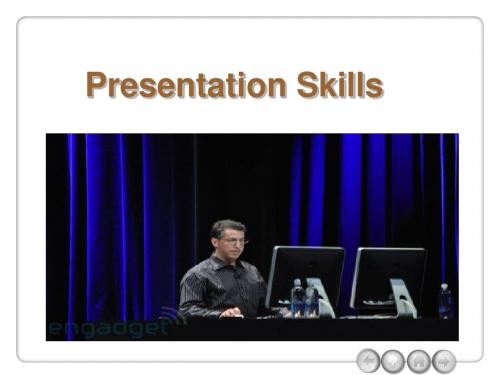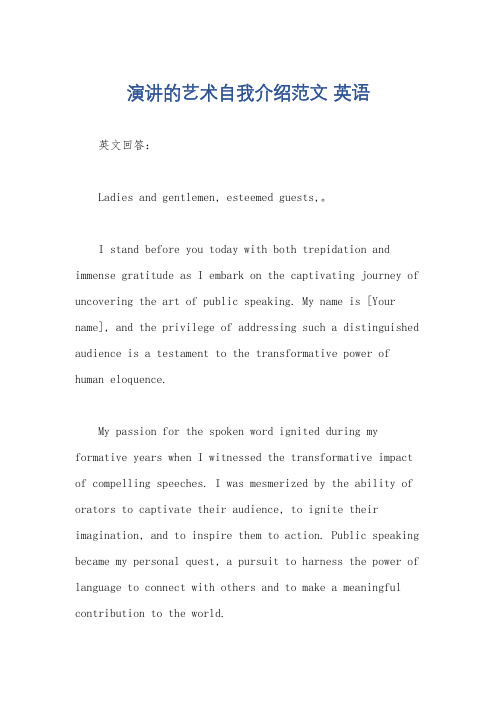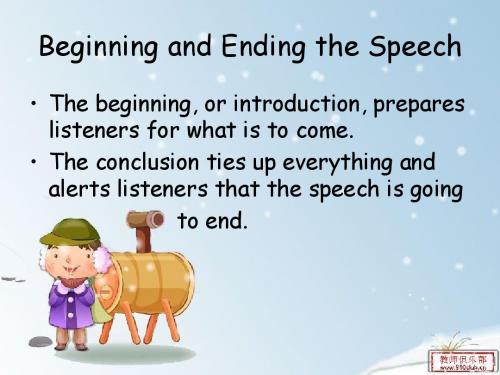英语演讲的艺术weekone
《演讲的艺术》About Introduction

2. Startle the Audience
Make sure the startling introduction relates directly to the subject of your speech
Introduction: Sample Introduction: ( A speech about the problem of sexual assault against women ) Take a moment and think of the three women closest to you. Who comes to mind? Your mother ? Your sister ? Your girlfriend? Your wife? Your best friend? Now guess which one will be sexually It’s assaulted during her lifetime. It s not a pleasant thought, but U. according to the U.S. Department of justice, one of every three American women will be sexually assaulted sometime during her life.
Task 1: Find out how many methods we’ve learned today are used in this introduction. Task 2: Give some explanation about how they are employed.
Vocabulary gridlock: (n),交通全面阻塞 cripple: (vt),使…陷入瘫痪状态 strand: (vt),使…困于某地,束手无 策. impenetrable: (adj), 费解的,难 以理解的。 simulation : (n)用计算机进行的 模拟。 stilled : (j)静止的。 earthly : (adj)现世的。 jaw-dropping apathy : (n)冷漠,不关心。
周一将发表演讲完成演讲自豪,英语作文

周一将发表演讲完成演讲自豪,英语作文On Monday, I will be giving a speech that I have been preparing for weeks. I am proud to say that I have put in a lot of effort and dedicated a significant amount of time to make sure that my speech is not only informative but also engaging. I believe that public speaking is an important skill to have, and I am excited to have the opportunity to share my thoughts and ideas with others.The topic of my speech is the importance of mental health awareness in today's society. As someone who has struggled with mental health issues in the past, this topic is very close to my heart. I want to shed light on the stigma surrounding mental health and encourage others to seek help if they are struggling. I believe that by opening up about my own experiences, I can help others feel less alone and inspire them to take care of their mental well-being.I have spent countless hours researching and practicing my speech to ensure that it is well-structured and engaging. I have included statistics, personal anecdotes, and practical tips for maintaining good mental health. I have also worked on my delivery, making sure to speak clearly and confidently while also allowing my emotions to shine through.I am confident that my speech will leave a lasting impact on my audience. I hope to inspire them to start conversations about mental health, break down barriers, and create a more supportive and understanding community. I believe that by sharing our stories and advocating for mental health awareness, we can make a positive change in the world.In conclusion, I am incredibly proud of the speech that I will be giving on Monday. I have put my heart and soul into preparing for this moment, and I am excited to finally share my thoughts with others. I hope that my speech will spark important conversations and encourage others to prioritize their mental well-being. Thank you for taking the time to read about my journey towards completing this speech, and I look forward to the opportunity to share it with you all.。
【管理资料】英语演讲的艺术week-six汇编

Speeches about Events
• Event: anything that happens is regarded as happening.
• The following are examples of suitable subjects: insomnia marriage World Cup Battle of Red Cliffs tsunami cyber crime
• Keep main points separate.
• Try to use the same pattern of wording for all main points.
• Balance the amount of time devoted to each main point.
Speeches about Processes
• To inform my audience about the major types of cyber crime.
• If your specific purpose is to recount the history of an event, you’ll organize your speech in chronological order, relating the incidents one after another in the order they occurred. Example-see APS page 181.
• To inform my audience about the
major theories explaining the
extinction of dinosaurs.
• Speeches about concepts are usually organized in topical order and focus on the main features or aspects of your concept. Example-see APS pages 183-184.
英语演讲的艺术weekthree

More Effective: To inform my audience
about the four major kinds of calendars used in the world today.
• The ineffective statement is adequate as an announcement of the speech topic.
• Subjects you know a lot about. • Subjects you want to know more about.
Topics You Know a Lot About
• Most people speak best about subjects with which they are most familiar.
• Sub lists for movies, Three Gorges, and Yang Liwei:
1. Movies: Academy Awards; prizes; lotteries; gambling.
2. Three Gorges: Yangtze River; Chongqing; mountains; flooding.
• Internet fraud
•
Jade
•
Kites
•
Leonardo da Vinci
•
Mount Tai
• Neo-Confucianism • Olympic Math • Peking Opera • Qiu Jin • Robots • Study abroad • Temple of Heaven • United Nations • Volunteering • Women’s gymnastics • Xuankong Si • Yoga • Zoos
演讲的艺术自我介绍范文 英语

演讲的艺术自我介绍范文英语英文回答:Ladies and gentlemen, esteemed guests,。
I stand before you today with both trepidation and immense gratitude as I embark on the captivating journey of uncovering the art of public speaking. My name is [Your name], and the privilege of addressing such a distinguished audience is a testament to the transformative power of human eloquence.My passion for the spoken word ignited during my formative years when I witnessed the transformative impact of compelling speeches. I was mesmerized by the ability of orators to captivate their audience, to ignite their imagination, and to inspire them to action. Public speaking became my personal quest, a pursuit to harness the power of language to connect with others and to make a meaningful contribution to the world.Over the years, I have immersed myself in the study of rhetoric and communication. I have pored over the works of master orators, from the classical eloquence of Cicero to the modern brilliance of Martin Luther King Jr. I have sought guidance from renowned teachers, eager to absorb their wisdom and refine my craft. Each experience has been a stepping stone on my path toward becoming an effective public speaker.The art of public speaking, I believe, is an intricate tapestry woven from a multitude of essential elements. It demands a deep understanding of one's audience, a mastery of language, an unwavering conviction, and the ability to engage and captivate. Like a symphony conductor leading an orchestra, a great orator harmonizes all these elements to create a profound and lasting impression.At its core, public speaking is about the power of connection. It is about building a bridge between the speaker and the audience, a bridge that allows for the exchange of ideas, emotions, and experiences. Through thespoken word, we have the ability to transcend the boundaries of time and space, to touch the hearts and minds of others, and to inspire them to greatness.In this pursuit, there will undoubtedly be challenges along the way. The fear of public speaking is a universal human experience, but it is a fear that can be overcome with preparation, practice, and perseverance. For true eloquence is not born out of perfection, but rather from the courage to embrace our imperfections and to use them as fuel for growth.As I embark on this journey, I am filled with both excitement and humility. I am excited to share my passion for the art of public speaking and to inspire others to discover their own potential as communicators. And I am humbled by the opportunity to learn from each of you, to grow both as a speaker and as a human being.Public speaking is an art that empowers us to make a difference in the world. Through our words, we can educate, motivate, inspire, and unite. We can bridge divides, fosterunderstanding, and create a better future for ourselves and for generations to come.I invite you to join me on this extraordinary adventure. Let us explore together the boundless possibilities of the spoken word and embrace the transformative power of human eloquence.Thank you.中文回答:尊敬的各位来宾,女士们、先生们,。
英语演讲的艺术

A successful beginning could:
I. Get the attention and interest of your audience. II. Create a positive relationship with the audience. III. Establish your credibility. IV. Preview the body of the speech.
Beginning and Ending the Speech
E. Begin with a story Example:
We usually do not have a high opinion of people who drop out of school. Well , I want to mention a man who did just that. He never finished college. In stead, in the 1970’s he tinkered in is garage with a relatively new gadget called the computer. Instead if being concerned with how to build a better computer or even different computer, this young man focused his attention on the software programs that might run on the computer. Today, Bill Gates is the richest man in the world, and the company he founded, Microsoft, makes programs for most of the computers in the world. Not bad for a college dropout.
英语演讲的艺术week-one
• Physical setting: a speech is presented indoors or out, to a densely packed crowd or to a handful of scattered souls
Nervousness is Normal
• Stage fright is a common occurrence
• Greatest public speakers in history suffered from it: Mahatma Gandhi, Abraham Lincoln, Winston Churchill
Channel
• Means by which a message is communicated
• Use one or more channels, each of which will affect the message received by the audience
• Radio, television, microphone, etc.
Course Introduction
• Improve skills of writing and presenting effective public speeches
• Special emphasis on informative and persuasive discourse
• Benefit you in your future career and life as a citizen in a global age
英语演讲的艺术6(主体)
• Main points are not stated expressly in your specific purpose. • To inform my audience of the basic steps in making a cloisonné (景泰蓝) object. Specific Purpose: To inform my audience of the steps in making a cloisonné object. Central Idea: There are five basic steps in making a cloisonné object.
Specific Purpose: To inform my audience
how the Great Wall of China was built. Central Idea: The Great Wall of China was built in three major stages.
Main Points:
Specific Purpose: To
inform my audience about the three major regions in Italy. Central Idea: Northern, central, and southern Italy have their own identities and attractions.
Specific purpose: To inform my audience
about the structure of a typhoon. Central Idea: A typhoon is made up of three parts of going from inside to outside.
英语演讲的艺术
The art of Public speaking
首先从“外研社杯”全国 英语大赛比赛规则讲起
The art of Public speaking
Speaking
The art of Public Speaking
比赛程序
第一阶段 1. 定题演讲:每位选手演讲时间3分钟 题目:What we cannot afford to lose
The art of Public Speaking
评分标准
第一阶段:
prepared 20% 20%
20%
questions 15% 15%
10%
total
100
content language
delivery
The art of Public Speaking
第二阶段:
即兴演讲 回答问题 综合知识 合计
theartofpublicspeakingtheartofpublicspeaking首先从外研社杯全国首先从外研社杯英语大赛比赛规则讲起全国theartofpublicspeakingspeakingtheartofpublicspeaking?比赛程序?第一阶段?1
The art of Public Speaking
The art of Public Speaking
Japanese businessmen have already applied Confucian ethics in the their business management, and the American military academy, West Point, has taken Sunzi’s The Art of War as one of their textbooks. In theses years, the cream of our culture, such as traditional medical science and medicine, acupuncture, Tai Chi, and paper cutting, has won popularity in the world.
(完整版)《演讲的艺术》chapter1-5课后summary
(完整版)《演讲的艺术》chapter1-5课后summaryChapter1 speaking in publicPeople throughout history have used public speaking as a vital means of communication and empowerment. Because you will live the rest of your life in a globalized world, the need for English public speaking will almost surely touch you at some time.To be successful giving speeches in English, you need to be culturally competent communicator. You must show respect for the cultural values and expectations of the people who come to hear you. This dose not mean that you have to devalue your own culture. There is no inherent conflict between being a competent English public speaker and being fully Chinese.Because public speaking involves the use of English as a working language, it requires critical thinking skills. Critical thinking helps you organize your ideas, spot weaknesses in other people’s reasoning, and avoid them in your own.There are many similarities between public speaking and conversation, but there are also important differences. First, public speaking requires more detailed preparation than ordinary conversation. Second, it requires more formal language. Third, it demands that speakers adjust their voices to the larger audience and work at avoiding distracting physical mannerisms and verbal habits.The speech communication process includes seven elements: speaker, message, channel, listener, feedback, interference, and situation. The interaction of these elements determines the outcome of any public speech.Chapter2 speaking confidently and ethicallystage fright is an issue for public speakers in all countries.Rather than trying to eliminate every trace of stage fright, you should try to transform it into positive energy. To some extent, this will happen naturally as you gain experience as a speaker, but you should also think positively, prepare thoroughly, visualize yourself giving a successful speech, remember that most nervousness is not visible to the audience, and think of your speech as communication rather than as a performance in which you must do everything perfectly Because public speaking is a form of power, it carries with it heavy ethical responsibili ties. There are four basic guidelines for ethical speechmaking. The first is to make sure your goals are ethically sound. The second is to be fully prepared for each speech. The third is to be honest in what you say. The fourth is to put ethical principles into practice at all timesOf all the ethical lapses a speaker can commit, few are more serious than plagiarism lobal plagiarism is lifting a speech entirely from a single source. Patchwork plagiarism involves cutting and pasting a speech from a limited number of sources. Incremental pla giarism occurs when a speaker fails to give credit for specific quotations and paraphrases that are borrowed from other people Because it is so easy to copy information from the Internet, it poses special challenges with regard to plagiarism. If you don't cite Internet sources, you are just as guilty of plagia- rism as if you take information from print sources without proper citation. As you research your speeches, be sure to take accurate notes of the Internet sources you use so you can identify them in your speechChapter3 giving your first speechOne of your first assignments will be to present an introductory speech, either a speech of self-introduction or aspeech introducing a classmate. Focus the speech on a limited number of ideas and be creative in developing them. Use interesting supporting materials and present them in colorful, descriptive language.When organizing the speech, make sure you have a clear introduction, body, and conclusion. Most introductory speeches fall naturally into chronological or topical order. Using clear transitions will help your audience follow you from point to point.Although you will write a complete manuscript or outline of your speech when preparing it, you should deliver it extemporaneously. This means you have rehearsed fully and can present your talk from a brief set of speaking notes. Concentrate on establishing eye contact with the audience and on speaking in a dynamic, engaged tonof voiceChapter4 selecting a topic and purposeThe first step in speechmaking is choosing a topic. If you have trouble picking a topic, you can use clustering, a personal inventory, or an Internet search to come up with something that is right for you.The general purpose of your speech will usually be to inform or to persuade. When your general purpose is to inform, your goal is to communicate information clearly, accurately, and interestingly. When your general purpose is to persuade, your goal is to win listeners over to your point of viewOnce you know your topic and general purpose, you must focus on a specific purpose statement that indicates precisely what your speech seeks to achieve. The specific purpose statement should (1) be a full infinitive phrase; (2) be worded as a statement, not a question:(3) avoid figurative language;(4) not be vague or general; (5) be appropriate for your audience; and(6)be achievable in the allotted time.The central idea is a concise statement of what you will say in your speech, and it usually crystallizes in your thinking after you have done your research and have decided on the main points. In most cases, it encapsulates the main points in a single declarative sentence Chapter5 analyzing the audience Good speakers are audience-centered. When working on your speeches, keep three questions in mind: To whom am I speaking? What do I want them to know, believe, or do as result of my speech? What is the most effective way of composing and presenting my speech to accomplish that aim?People are egocentric. They typically approach speeches with one question uppermost in mind: "why is this important to me?" Therefore you need to study your audience and adapt your speech to their beliefs and interests.The major factors to consider in audience analysis are size, physical setting, demographic traits disposition toward the topic, disposition toward the speaker, and disposition toward the occasion, For speeches outside the classroom, you can get information about the audience by asking the person who invites you to speak. For classroom speeches, you can circulate an audience-analysis questionnaire.Once you complete the audience analysis, you must adapt your speech so it will be clear and convincing. Try to hear the speech as your listeners will. Anticipate questions and objections, and try to answer them in advance. When you deliver the speech, keep an eye out for audience feedback, and adjust your remarks in response. After the speech, think about your audience's response and about changes you would make if you were delivering the speech again。
- 1、下载文档前请自行甄别文档内容的完整性,平台不提供额外的编辑、内容补充、找答案等附加服务。
- 2、"仅部分预览"的文档,不可在线预览部分如存在完整性等问题,可反馈申请退款(可完整预览的文档不适用该条件!)。
- 3、如文档侵犯您的权益,请联系客服反馈,我们会尽快为您处理(人工客服工作时间:9:00-18:30)。
Channel
• Means by which a message is communicated
• Use one or more channels, each of which will affect the message received by the audience
• Radio, television, microphone, etc.
• Internal: toothache, any other pain, worry about the CET4/6, brood about an argument with his girlfriend
Situation
• The time and place in which speech communication occurs
Martin Luther King
Margaret Thatcher
Nelson Mandela
Enjoy a Video from Gu Qiubei
顾秋蓓,2003年21世纪杯全国英语演讲比赛冠军
Overview of Public Speaking
• Course introduction • Course objectives • Types of speeches • 7 elements of communication process • Speak confidently and ethically
Course Introduction
• Improve skills of writing and presenting effective public speeches
• Special emphasis on informative and persuasive discourse
• Benefit you in your future career and life as a citizen in a global age
英语演讲的艺术weekone
Pre-class Explanation
• Teacher’s self-introduction: Wu Dianlong ()
• Course grading: 1. introductory speech (40%) 2. informative speech (40%) 3. attendance (20%)
Becoming a Confident Speaker
• Stage fright: anxiety over the prospect of giving a speech in front of an audience
• US national survey: 42% of respondents-giving a speech as top fear; in comparison, only 28% said they’re afraid of dying
• This is your assignment • One part of final examination • Hand in one manuscript next class • Be delivered in week 7
Informative Speech
• Inform the audience about an object, concept, process, or event
Seven Elements of Communication Process
• Speaker-演讲者 • Message-信息 • Channel-渠道 • Listener-听众 • Feedback-反馈 • Interference-干扰 • Situation-场景
Speaker
Your success as a speaker depends on: • Personal credibility • Knowledge of the subject • Preparation of the speech • Manner of speaking • Sensitivity to the audience
• Narrow your topic down to something you can discuss adequately in the time allowed for the speech
• Choose supporting details to make your ideas clear and convincing
• Certain situations: funerals, weddings, graduation ceremonies, open ceremonies
• Physical setting: a speech is presented indoors or out, to a densely packed crowd or to a handful of scattered souls
• Textbook: Stephen E. Lucas, with Yin Suya, The Art of Public Speaking, 10th Edition, Specially Adapted for Chinese Readers (Beijing Foreign
Language Teaching and Research Press, 2010)
• Seek either passive agreement or immediate action from the audience
• Emphasis is given to evidence and reasoning in constructing persuasive arguments
Introductory Speech
• Introduce yourself (or anyone around you)
• Focus on some aspect of your (anyone’s) personality, background, beliefs, or aspirations
Commemorative Speech
• To pay tribute to (称赞,歌颂)a person, a group of people, an institution, or an idea
• Seek to use language creatively and imaginatively so as to invest the topic with dignity, meaning, and honest emotion.
• Organize your ideas well • Express your message in accurate, clear,
vivid and appropriate words • Send a message with your tone of voice,
appearance, gestures, facial expression, and eye contact • Make sure your nonverbal message not distract from your verbal message
Speak Confidently and Ethically
• Becoming a confident speaker: a) nervousness is normal b) dealing with nervousness
• Being an ethical speaker a) guidelines for ethical speaking b) plagiarism
• Use of a visual aid is required • One part of final examination • Be delivered in week 13
Persuasive Speech
• To persuade the audience for or against a question or policy
Stephen E. Lucas and Big Dragon
Modern famous speakers
• Franklin Roosevelt • Martin Luther King • Margaret Thatcher • Nelson Mandela • … etc.
Franklin Roosevelt
Course Objectives
• To improve your ability to write effective public speeches
• To improve your ability to deliver effective public speecty to think critically and to apply the skills of critical thinking to the analysis of written and oral texts
• To improve your ability to listen effectively to public speeches
Types of Speeches
• Introductory speech • Informative speech • Persuasive speech • Commemorative speech
• Audience-centered
Feedback
• The messages, usually nonverbal, sent from a listener to a speaker
